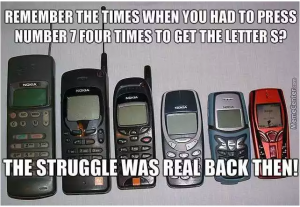I am going to take a wild guess and presume we have all endured calls from boomers and the gen-x asking why their smartphones or laptops misbehave. As you bite your tongue on that sarcastic comment and patiently explain that they clicked the wrong button, a scary thought may cross your mind: “will I be like this when I am older?” And, as technological revolutions have constantly been redefining how we communicate, your fears are not entirely misplaced. This realisation drags us to confront a nagging (and possibly scary) question – are we ready to embrace change?
What are we missing?
Perhaps the romance. In the days when communication happened through say letters, there was something tangible about the words. A sort of delayed gratification was at play – something that texts or calls are unable to offer. Whether it was a photograph or a letter from a dear one, you had to patiently wait to receive it. You got time to respond to things around you, unlike now, when you are compelled to think fast and talk smart. Perhaps this is the reason why the older generations tend to believe that communication prior to technology was less complicated.
However, views around the advent of communication technology are polarizing. Whether you are old school or tech-savvy, imagining your life before a smartphone is challenging. The digital revolution has superseded every other form of communication – particularly for brands and businesses. There is an un-ignorable itch to document every moment of one’s life. Without their phones, individuals experience separation anxiety with as much as 66% of the population displaying signs of ‘nomophobia’ (the fear of being away from your phone).
But It’s Not All Bad… Right?
When you think about how technology has aided communication you realise that the journey is nothing short of incredible. So, let us walk down the memory lane, shall we?


- Telephones to Smartphones: Within 50 years of its invention, the telephone became a household essential. However, as the user had to be tethered to the phone, their flexibility and privacy were compromised. This changed with the invention of a mobile phone by Motorola in 1973 followed by the revolutionary iPhone by Steve Jobs in 2007. Now, technology does not have to be limited to your smartphones. You can even speak using smartwatches and even sunglasses. To say that these inventions changed how we communicate is a bit of an understatement.
- Internet: The internet opened up a whole new world of communication. You could now stay in touch with people across the globe with instant messaging, emails, video calls, etc. Internet vastly widened the scope of communication in not only a person-to-person context but also transformed how businesses connected with their customers.
- Immersive Communication: Virtual reality is a sci-fi dream that our very own Mr. Z is set to actualise through the Metaverse. It has taken the world by such a storm that no conversation about communication and technology is complete without speaking about meta. To foresee communication through the lens of virtual presence no longer seems unfathomable. You can now continue to work from home and attend office through your virtual avatar using Horizon Workrooms. Don’t believe me? See it for yourself here.
Next Stop? Overcoming the Fear of Technology
I think we can unanimously agree that sometimes technology can be a lot to take in. You keep feeling that there is something new to learn every day – which sounds exciting theoretically, but it can be quite exhausting. Yet, in this ever-evolving world, there is hardly a way around communication technology (particularly for marketers). So, how then can you overcome this technophobia? Here are some tips: –
- Understand it by shamelessly asking questions
Fear of technology is really just fear of the unknown. And with popular culture repeatedly showing doomsday because of technology, this fear has only deepened. In reality, technology (or communication technology in particular) is designed to be user-friendly. If you find yourself stuck somewhere concerning the usage, don’t hesitate to ask for help from the younger generation. It will come as no surprise that teenagers and young adults find it easier to embrace new technological developments as compared to their older counterparts.
- Use it and have fun with it (but in moderation)
The easiest way to learn something is to have fun with it. Fortunately for you, there is no dearth of “fun” when you use technology – it’s part of the reason why smartphones are so addictive. Whether it is social media or virtual reality, don’t hesitate to experiment and experience it. The more you use technology the more comfortable you get with it.
- Take that tech class – it really is an investment
To get you started, formal training is always the best way. When you learn about technology from the experts, you don’t merely understand usage but also its application in your life. For advertising and marketing professionals, for instance, taking a class on digital marketing is highly beneficial. If you wish to test the waters you can explore free courses online such as “fundamentals of digital marketing” by Google. Alternatively, if you want to know what the rave about social media is all about, you can enrol for the “Social Media Marketing in Practice Specialization” course available for free on Coursera. Undertaking professional courses will not only help learners advance in their profession but also enable them to become more technologically relevant and creative in their approach.
Signing off, technology opens up a whole new world of communication and so, instead of masking your fear by saying “we had it better in our days” I recommend being a little more open about technology (and everything actually) to be ahead of the curve and be relevant.
Stay curious. Stay secure.
See you next week.
The views and opinions published here belong to the author and do not necessarily reflect the views and opinions of the publisher.



Be the first to comment on "The Communication-Nostalgia paradox"